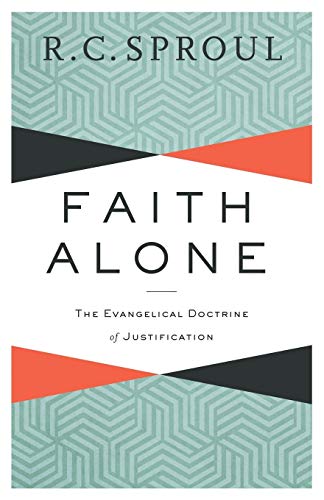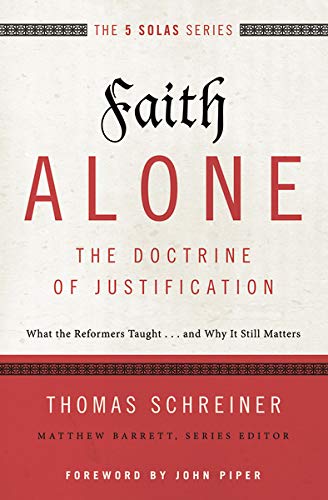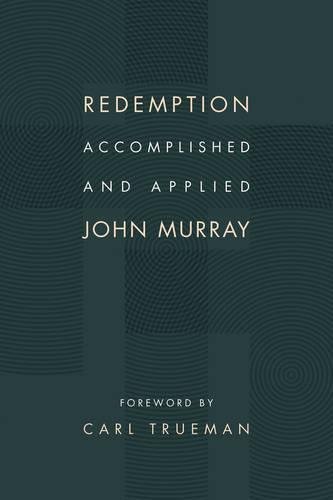Quotes about Sanctification-Justification
Christ “for us” is our justification (2Co 5:21). “Christ in us, and we in Christ,” is our holiness. The former is the external substitution; the latter, the internal energy or operation, taking its rise from the former, yet not to be confounded with it or substituted for it.
Sanctification and justification are both gifts from God and expressions of His grace. Though they are each distinct aspects of salvation, they can never be separated. God never grants justification without also giving sanctification at the same time.
Transforming Grace, NavPress, 1991, p. 106. Used by permission of NavPress – www.navpress.com. All rights reserved. Get this book!
Those who have been justified are now being sanctified; those who have no experience of present sanctification have no reason to suppose they have been justified.
Romans – Tyndale New Testament Commentaries, Eerdmans, www.eerdmans.com, 1998, p. 135.
If you do not put a difference between justification wrought by the Man Christ without, and sanctification wrought by the Spirit of Christ within…you are not able to divide the word aright; but contrariwise, you corrupt the word of God.
A Puritan Golden Treasury, compiled by I.D.E. Thomas, by permission of Banner of Truth, Carlisle, PA. 2000, p. 162.
Justification and sanctification, gifts of grace, go together as if tied by an inseparable bond, so that if anyone tries to separate them, he is, in a sense, tearing Christ to pieces. Sanctification doesn’t just flow from justification, so that one produces the other. Both come from the same Source. Christ justifies no one whom He does not also sanctify. By virtue of our union with Christ, He bestows both gifts, the one never without the other.
Sanctification is a gift just as justification is (a double grace, or duplex gratia, as Calvin called it). Both are the gift of God, ours by virtue of union with Christ. Both are found in Christ alone. Both are necessary for salvation – justification being the root and sanctification being the fruit. As is often said: faith alone justifies, but the faith that justifies is never alone. So we must never separate justification and sanctification. The former can’t help but produce the latter, and the latter must flow from the former. And yet we should not be afraid to talk about justification in a different way than we talk about sanctification. One calls us to rest; the other to fight. One reckons us righteous; the other makes us righteous. One allows for no increase or degrees; the other expects progress and growth. One is a declaration of God about us, the other a work of God in us.
The Gospel Coalition – The full series of posts can be found here: http://thegospelcoalition.org/blogs/kevindeyoung/.
The Bible repeatedly emphasizes the legal aspects of justification. God does not make us righteous in that moment; God declares us righteous in that moment, just like a judge passes sentence on the defendant in his courtroom. Through the ministry of the Holy Spirit God will over time make us more and more righteous in the way we live. This process is called sanctification. But we do not grow in sanctification in order to be justified. We grow in sanctification because we are justified. The declarative act of justification is gracious soil out of which grace-filled lives will grow.
Justification by Jay Harvey taken from Don’t Call it a Comeback, edited by Kevin DeYoung, copyright 2011, Crossway Books, a division of Good News Publishers, Wheaton Illinois 60187, www.crosswaybooks.org, p. 97.
You cannot take Christ for justification unless you take Him for sanctification. Think of the sinner coming to Christ and saying, “I do not want to be holy;” “I do not want to be saved from sin;” “I would like to be saved in my sins;” “Do not sanctify me now, but justify me now.” What would be the answer? Could he be accepted by God? You can no more separate justification from sanctification than you can separate the circulation of the blood from the inhalation of the air. Breathing and circulation are two different things, but you cannot have the one without the other; they go together, and they constitute one life. So you have justification and sanctification; they go together, and they constitute one life. If there was ever one who attempted to receive Christ with justification and not with sanctification, he missed it, thank God! He was no more justified than he was sanctified.
Do we realize that if we truly understand the doctrine of justification by faith we have already grasped the essence and the nerve of the New Testament teaching about holiness and sanctification? Have we realized that to be justified by faith guarantees our sanctification, and that therefore we must never think of sanctification as a separate and subsequent experience?
Only a fraction of the present body of professing Christians are solidly appropriating the justifying work of Christ in their lives… In their day-to-day existence they rely on their sanctification for justification… Few know enough to start each day with a thoroughgoing stand upon Luther’s platform: you are accepted, looking outward in faith and claiming the wholly alien righteousness of Christ as the only ground for acceptance, relaxing in that quality of trust which will produce increasing sanctification as faith is active in love and gratitude.
Justification is being declared righteous. Sanctification is being made righteous. Justification is objective and a unilateral act of God; it relates to our position before God. Sanctification is subjective and a process in which we are daily involved; it relates to our practice before God. Justification is complete, total, and immediate at the moment of conversion. Sanctification is progressive, beginning at the moment we are converted and continuing until the moment we go to be with the Lord. These two doctrines are distinct, yet inseparable, for God never justifies without also sanctifying.
Pastoral Leadership for Manhood and Womanhood, ed. Wayne Grudem and Dennis Rainey, Crossway, 2002, p. 193-194.
Christian living goes by the same ground rules as Christian conversion. Justification by grace alone through faith alone in Christ alone apart from all our works — that’s how we enter, that’s how we live. We never advance beyond grace. We never graduate to “deeper things.” Sanctification gets traction from the positive energy of justification.
Just as our justification is from God, so our sanctification is from God, but unlike our justification, which is monergistic work, in sanctification God calls us to work together with Him to mature as Christians. As Christians we can never say to God: “The reason I still sin, or the reason I am not maturing as quickly as I would like, is because you have not given me enough grace.”
Assured by God, P&R, 2006, p. 29. Used by Permission. Get this book!
It is crucial…that we not confuse or combine justification and sanctification. Confusing them will, in the end, undermine the gospel, and turn justification by faith into justification by performance.
Faith Alone and the Fight for Joy taken from When the Darkness Will Not Lift by John Piper, 2006, Crossway Books, a division of Good News Publishers, Wheaton Illinois 60187, www.crosswaybooks.org. p. 18.
Moreover, the Scriptures nowhere teach us that faith sanctifies us in the same sense and in the same manner that faith justifies us! Justifying faith is a grace that “worketh not,” but simply trusts, rests, and leans on Christ (Rom. 4:5). Sanctifying faith is a grace of which the very life is action: it “worketh by love,” and, like a mainspring, moves the whole inward man (Gal. 5:6).
We must be saints before we die, if we are to be saints afterwards in glory. The favorite idea of many, that dying men need nothing except absolution and forgiveness of sins to fit them for their great change, is a profound delusion. We need the work of the Holy Spirit as well as the work of Christ; we need renewal of the heart as well as the atoning blood; we need to be sanctified as well as to be justified.
I fear it is sometimes forgotten that God has married together justification and sanctification. They are distinct and different things, beyond question, but one is never found without the other. All justified people are sanctified, and all sanctified are justified. What God has joined together let no man dare to put asunder. Tell me not of your justification, unless you have also some marks of sanctification. Boast not of Christ’s work for you, unless you can show us the Spirit’s work in you. Think not that Christ and the Spirit can ever be divided.
In what, then, are justification and sanctification alike? (a) Both proceed originally from the free grace of God. It is of His gift alone that believers are justified or sanctified at all. (b) Both are part of that great work of salvation which Christ, in the eternal covenant, has undertaken on behalf of His people. Christ is the fountain of life, from which pardon and holiness both flow. The root of each is Christ. (c) Both are to be found in the same persons. Those who are justified are always sanctified, and those who are sanctified are always justified. God has joined them together, and they cannot be put asunder. (d) Both begin at the same time. The moment a person begins to be a justified person, he also begins to be a sanctified person. He may not feel it, but it is a fact. (e) Both are alike necessary to salvation. No one ever reached heaven without a renewed heart as well as forgiveness, without the Spirit’s grace as well as the blood of Christ, without a meetness for eternal glory as well as a title. The one is just as necessary as the other.
[How] justification and sanctification…differ… (a) Justification is the reckoning and counting a man to be righteous for the sake of another, even Jesus Christ the Lord. Sanctification is the actual making a man inwardly righteous, though it may be in a very feeble degree. (b) The righteousness we have by our justification is not our own, but the everlasting perfect righteousness of our great Mediator Christ, imputed to us, and made our own by faith. The righteousness we have by sanctification is our own righteousness, imparted, inherent, and wrought in us by the Holy Spirit, but mingled with much infirmity and imperfection. (c) In justification our own works have no place at all, and simple faith in Christ is the one thing needful. In sanctification our own works are of vast importance and God bids us fight, and watch, and pray, and strive, and take pains, and labor. (d) Justification is a finished and complete work, and a man is perfectly justified the moment he believes. Sanctification is an imperfect work, comparatively, and will never be perfected until we reach heaven. (e) Justification admits of no growth or increase: a man is as much justified the hour he first comes to Christ by faith as he will be to all eternity. Sanctification is eminently a progressive work, and admits of continual growth and enlargement so long as a man lives. (f) Justification has special reference to our persons, our standing in God’s sight, and our deliverance from guilt. Sanctification has special reference to our natures, and the moral renewal of our hearts. (g) Justification gives us our title to heaven, and boldness to enter in. Sanctification gives us our meetness for heaven, and prepares us to enjoy it when we dwell there. (h) Justification is the act of God about us, and is not easily discerned by others. Sanctification is the work of God within us, and cannot be hid in its outward manifestation from the eyes of men.
I am persuaded that one great cause of the darkness and uncomfortable feelings of many well-meaning people in the matter of religion, is their habit of confounding, and not distinguishing, justification and sanctification. It can never be too strongly impressed on our minds that they are two separate things. No doubt they cannot be divided, and everyone that is a partaker of either is a partaker of both. But never, never ought they to be confounded, and never ought the distinction between them to be forgotten.
It’s all are welcome as they are, but when you come change is expected. Or it’s not clean yourself up before God will accept you, but when God accepts you He will clean you up. Or it’s God loves sinners, but He loves them too much to keep them sinners. Or as I like to say, God doesn’t clean His fish before He catches them, but after He catches them He always immediately starts cleaning them.
The steamship whose machinery is broken may be brought into port and made fast to the dock. She is safe, but not sound. Repairs may last a long time. Christ designs to make us both safe and sound. Justification gives the first – safety; sanctification gives the second – soundness.
Justification is free (Jn. 4:1)
Sanctification is costly (Lk. 14:25-33)
Justification is instantaneous (Jn. 3:8)
Sanctification is a life-long process (Jn. 8:31)
Justification is by faith (Eph. 2:8)
Sanctification is by faithfulness (1 Cor. 4:2)
Justification is not of works (Eph. 2:9)
Sanctification is of works (Eph. 2:10)
Justification involves Christ’s love for me (Jn. 3:16)
Sanctification involves my love for Christ (1 Jn. 4:19)
Justification concerns Christ’s righteousness (2 Cor. 5:21)
Sanctification concerns my righteousness (Lk. 14:25-33)
Justification involves my position in Christ (Col. 2:11-14)
Sanctification involves my practice (Col. 3:1-11)
Justification considers what God has done (1 Cor. 15:3-4)
Sanctification considers what I am doing (Lk. 14:25-33)
Justification is God’s commitment to me (1 Jn. 5:9-13)
Sanctification is my commitment to God (Jn. 14:15)
Justification requires obedience to one command: to believe the Gospel (Ac. 6:7)
Sanctification requires obedience to all of Christ’s commands (Matt. 28:19-20)
Justification focuses on the cross which Jesus took up once and for all (1 Cor. 1:18)
Sanctification focuses on the cross which I am to take up daily (Lk. 9:53)
Justification is finished at the moment of faith (Jn. 5:24)
Sanctification is not finished until I go to be with the Lord (1 Cor. 9:24-27)
Works that are the outflowing of our salvation are never, then, the root or the basis of our right standing before God, but rather they are the fruit or the demonstration of our true salvation. They testify to the genuineness and reality that we are now His children, that His Spirit lives within, and that the faith that brought us justification continues as a living faith now to bring us ongoing sanctification.
What God has joined together – justification and sanctification – let no one separate.
It is absurd to imagine that God should justify a people and not sanctify them, He should justify a people whom He could not glorify.
A Puritan Golden Treasury, compiled by I.D.E. Thomas, by permission of Banner of Truth, Carlisle, PA. 2000, p. 141.
What is sanctification?… Regeneration is the new birth, sanctification is the growth that necessarily results from it. Justification is God’s declaration that a believing sinner is righteous because of the merits of Christ imputed to him. Sanctification is the believer leaving the courtroom where God has once and for all time declared him righteous, and immediately beginning the process whereby God’s Spirit enables him to increasingly conform to Christ’s righteousness, both inwardly and outwardly… We may say that sanctification has nothing to do with regeneration or justification, and yet it has everything to do with demonstrating that one has experienced them.
What role does sanctification play in salvation? © 9Marks. Website: www.9Marks.org. Email: [email protected]. Toll Free: (888) 543-1030. Used by Permission.






















